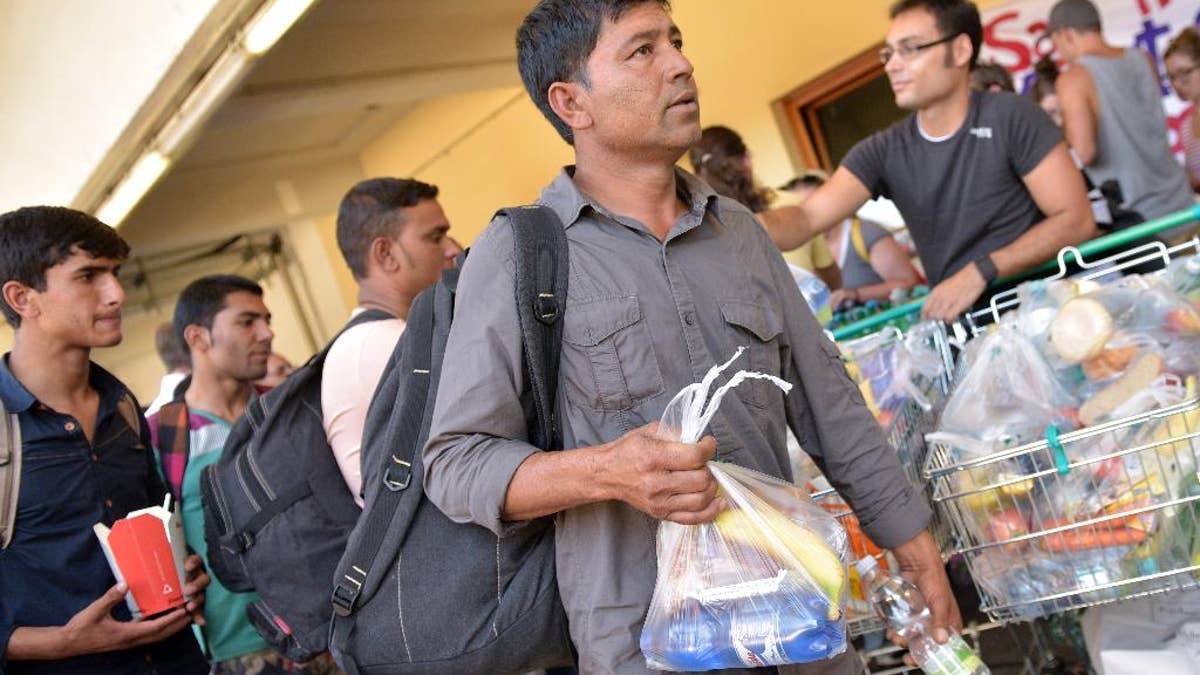
People receive food after they arrived at the Western railway station in Vienna, Austria, on Tuesday, Sept. 1, 2015. Some hundreds of migrants arrived by train from southern Europe, after making a perilous journey into Europe. (AP Photo/Hans Punz) (The Associated Press)
Europe’s illegal immigration problems are daily growing more serious, evidenced by the human tragedies of North Africans and Middle Easterners dying at sea or in overcrowded vehicles. Precise statistics are in short supply, but the numbers involved are unquestionably at crisis levels.
While Americans may believe that Europe, long disdainful of our own intense debate over border-security problems, is getting what it deserves, we should nonetheless focus on both the potential threats and lessons applicable to us. One critical cause of Europe’s illegal-immigration spike is the growing chaos across the greater Middle East. This spreading anarchy derives, in substantial part, from Barack Obama’s deliberate policy of “leading from behind” by reducing U.S. attention to and involvement in the region. When America’s presence diminishes anywhere in the world, whatever minimal order and stability existed there can rapidly evaporate.
For years, the central cause of population movements into Europe was economic: North Africans crossed the narrow Strait of Gibraltar or headed to France or Italy. Turks and Arabs entered through Greece and Eastern Europe. Once into the European Union (“EU”), thanks to the Schengen Agreement, travel barriers are now almost nonexistent, and, as in the United States, illegal aliens can essentially travel freely.
Now, however, after years of benefitting from cheap immigrant labor, Europeans are worried their borders have been too open. High birth rates among “non-nationals” (i.e., non-Europeans, in the politically correct phrase) are changing the very shape of their citizenry. This is particularly dramatic on the Old Continent, which has nothing like America’s tradition of the “melting pot” to absorb diverse immigrant populations. (Of course, even in this country, “Americanization” is under attack; ask Al Gore, who once translated E pluribus unum as “out of one, many,” exactly opposite its true meaning.) Europeans see growing immigrant communities living separately from “national” populations, but they have few if any ideas what to do about it.
When America’s presence diminishes anywhere in the world, whatever minimal order and stability existed there can rapidly evaporate.
Spreading terrorism, armed conflict and collapsing political authority in the Middle East are now powerful causal factors equaling or exceeding continuing economic disparities. Europe fears being overwhelmed by the sheer numbers of people on the move, thereby losing control over decisions on who to admit and who to turn away. These concerns are legitimate, but there are deeper risks as well. Mirroring worries in Washington, there is a serious and rising Islamicist terrorist threat hidden within the tides of people seeking refuge.
Photos of immigrants trying to storm the Eurostar train’s “chunnel” entrance in France to cross under the English Channel to Britain compete with videos of the recent terrorist attack on the Thalys high-speed train between Amsterdam and Paris. How many boat people and others who seem to be economically motivated are actually terrorists, perhaps trained by the Islamic State in Syria or Iraq, seeking to conceal themselves among economic migrants to gain access to Europe? This is the same issue America faces on the Mexican border. Even the Obama administration recognizes the problem, as in 2011when it indicted senior Iranian Revolutionary Guards officials for plotting to assassinate Saudi Arabia’s Ambassador to Washington, using drug-cartel hit men who regularly crossed the Mexican border illegally.
Compounding the problem, tens of thousands of legitimate Middle Eastern refugees are fleeing religious genocide in their home countries, and several EU states, mostly in East and Central Europe, have moved quickly to grant them asylum. These refugees are primarily Christians from Syria and Iraq threatened by the Islamic State or other radical jihadis, but non-Christian sects like the Yazidis are also properly and successfully seeking asylum.
Hard though it may be for some to acknowledge it explicitly, the receiving European governments feel that their humanitarian decision to provide refuge to Christians and others fleeing radical Islamicists is far safer than accepting undifferentiated populations that may contain terrorists using the true refugees as cover. This is hardly farfetched. In 1980, Fidel Castro deliberately and cynically emptied Cuban prisons of true criminals and allowed them to escape to American in the Mariel boatlift, along with over 100,000 legitimate refugees. The Europeans are well to be cautious.
With the entire “European project” under enormous strain because of Greece’s financial crisis; increasing awareness of the EU’s “democratic deficit” whereby unelected Brussels bureaucrats wield enormous authority with essentially no accountability; and growing unease about the lack of American international leadership under Barack Obama, it is no surprise Europeans are nervous, many close to panic
The lesson for the United States is that reducing our global influence does not increase international peace and security. Quite the opposite. Obama’s retreat from the Middle East, whether in the aftermath of Libya, his disinterest in the Islamic State’s continuing rise, or his surrender to Iran’s nuclear-weapons program, are all part of the larger pattern. Europe’s illegal immigration problem is our problem as well.
